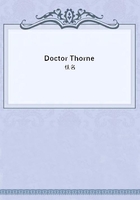
第15章
Dr Thorne's pretensions, mixed with his subversive professional democratic tendencies, his seven-and-sixpenny visits, added to his utter disregard of Lady Arabella's airs, were too much for her spirit. He brought Frank through his first troubles, and that at first ingratiated her; he was equally successful with the early dietary of Augusta and Beatrice; but, as his success was obtained in direct opposition to the Courcy Castle nursery principles, this hardly did much in his favour.
When the third daughter was born, he at once declared that she was a very weakly flower, and sternly forbade the mother to go to London. The mother, loving her babe, obeyed; but did not the less hate the doctor for the order, which she firmly believed was given at the instance and express dictation of Mr Gresham. Then another little girl came into the world, and the doctor was more imperative than ever as to the nursery rules and the excellence of country air. Quarrels were thus engendered, and Lady Arabella was taught to believe that this doctor of her husband's was after all no Solomon. In her husband's absence she sent for Dr Fillgrave, giving very express intimation that he would not have to wound either his eyes or dignity by encountering his enemy; and she found Dr Fillgrave a great comfort to her.
Then Dr Thorne gave Mr Gresham to understand that, under such circumstances, he could not visit professionally at Greshamsbury any longer. The poor squire saw there was no help for it, and though he maintained his friendly connexion with his neighbour, the seven-and-sixpenny visits were at an end. Dr Fillgrave from Barchester, and the gentleman at Silverbridge, divided the responsibility between them, and the nursery principles of Courcy Castle were again in vogue at Greshamsbury.
So things went on for years, and those years were years of sorrow. We must not ascribe to our doctor's enemies the sufferings and sickness, and deaths that occurred. The four frail little ones that died would probably have been taken had Lady Arabella been more tolerant of Dr Thorne. But the fact was, that they did die; and that the mother's heart then got the better of the woman's pride, and Lady Arabella humbled herself before Dr Thorne. She humbled herself, or would have done so, had the doctor permitted her. But he, with his eyes full of tears, stopped the utterance of her apology, took her two hands in his, pressed them warmly, and assured her that his joy in returning would be great, for the love that he bore to all that belonged to Greshamsbury.
And so the seven-and-sixpenny visits were recommenced; and the great triumph of Dr Fillgrave came to an end.
Great was the joy in the Greshamsbury nursery when the second change took place. Among the doctor's attributes, not hitherto mentioned, was an aptitude for the society of children. He delighted to talk to children, and to play with them. He would carry them on his back, three or four at a time, roll with them on the ground, race with them in the garden, invent games for them, contrive amusements in circumstances which seemed quite adverse to all manner of delight; and, above all, his physic was not nearly so nasty as that which came from Silverbridge.
He had a great theory as to the happiness of children; and though he was not disposed altogether to throw over the precepts of Solomon--always bargaining that he should, under no circumstances, be himself the executioner--he argued that the principal duty which a parent owed to a child was to make him happy. Not only was the man to be made happy--the future man, if that might be possible--but the existing boy was to be treated with equal favour; and his happiness, so said the doctor, was of much easier attainment.
'Why struggle after future advantage at the expense of the present pain, seeing that the results were so very doubtful?'
Many an opponent of the doctor had thought to catch him on the hip when so singular a doctrine was broached; but they were not always successful. 'What!' said his sensible enemies, 'is Johnny not to be taught to read because he does not like it?' 'Johnny must read by all means,' would the doctor answer; 'but is it necessary that he should not like it? If the preceptor have it in him, may not Johnny learn not only to read, but to like to learn to read?'
'But,' would say his enemies, 'children must be controlled.'
'And so must men also,' would say the doctor. 'I must not steal your peaches, nor make love to your wife, nor libel your character. Much as I might wish through my natural depravity to indulge in such vices, I am debarred from them without pain, and I may almost say without unhappiness.'
And so the argument went on, neither party convincing the other. But, in the meantime, the children of the neighbourhood became very fond of Dr Thorne.
Dr Thorne and the squire were still fast friends, but circumstances had occurred, spreading themselves now over a period of many years, which almost made the poor squire uneasy in the doctor's company. Mr Gresham owed a large sum of money, and he had, moreover, already sold a portion of his property. Unfortunately it had been the pride of the Greshams that their acres had descended from one another without an entail, so that each possessor of Greshamsbury had had the full power to dispose of the property as he pleased. Any doubt as to its going to the male heir had never hitherto been felt. It had occasionally been encumbered by charges for younger children; but these charges had been liquidated, and the property had come down without any burden to the present squire. Now a portion of this land had been sold, and it had been sold to a certain degree through the agency of Dr Thorne.